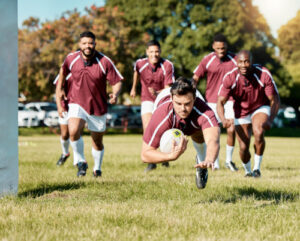In KwaZulu-Natal, rugby isn’t just a weekend pastime, it’s practically a birthright. Whether it’s the roar of the crowd at Kings Park Stadium in Durban or the sound of studs on the school fields of Pietermaritzburg, the game is part of the province’s rhythm. Drive through any town on a Saturday and you’re likely to see a local match drawing passionate spectators of all ages. Rugby here has a heartbeat of its own, echoing across beaches, valleys, and city centres.
The roots of rugby in KZN stretch back to the 19th century, when British settlers first introduced the game to coastal communities. By 1890, the Natal Rugby Union was formally established, marking the beginning of structured rugby in the province. What started with colonial clubs quickly grew into a thriving network of teams, leagues, and competitions that united diverse communities. Over the decades, tournaments like the Moor Cup and the Murray Cup cemented club rugby as a core part of local culture.
KZN has produced some legendary names in South African rugby, players like John Smit, the World Cup-winning Springbok captain, and André Joubert, known as “The Rolls-Royce of fullbacks.” But perhaps more importantly, the province has built a rugby culture that values development, inclusivity, and passion. Today, from elite academies to township youth programmes, rugby in KwaZulu-Natal continues to evolve, not just as a sport, but as a force that shapes identity, community pride, and national unity.
A Colonial Import Becomes a Local Staple
The earliest record of rugby being played in KwaZulu-Natal dates back to the 1870s, during British colonial rule. The first formal match was reportedly played on Durban’s Berea, with naval officers and settlers introducing the game to the region. By the 1890s, clubs were beginning to take shape, and in 1890, the Natal Rugby Union was officially established, laying the foundation for the organised growth of the sport.
These early days were marked by informal matches and loosely structured leagues. However, even in those modest beginnings, the appetite for rugby was evident. Local clubs quickly began forming in coastal towns and inland centres, creating inter-club rivalries that would eventually become institutionalised within the province’s competitive structure.
The Lifeblood of the Game
 KwaZulu-Natal’s club rugby culture has been the engine behind the sport’s sustained popularity. Clubs like College Rovers, Durban Collegians, and Varsity College have built reputations not only as competitive forces but as community hubs. These clubs have been instrumental in grooming young talent and providing an inclusive platform for players of all backgrounds to engage with the sport.
KwaZulu-Natal’s club rugby culture has been the engine behind the sport’s sustained popularity. Clubs like College Rovers, Durban Collegians, and Varsity College have built reputations not only as competitive forces but as community hubs. These clubs have been instrumental in grooming young talent and providing an inclusive platform for players of all backgrounds to engage with the sport.
The Moor Cup and the Murray Cup, two of the oldest club competitions in the country, remain essential to this ecosystem. Played with fierce intensity, these tournaments capture the essence of local rugby, passionate, raw, and authentic. For many aspiring players, club rugby in KZN is the first step on the ladder to provincial and national recognition.
The advent of professionalism in the mid-1990s changed the landscape of South African rugby. In KwaZulu-Natal, the transformation was embodied in the evolution of the Natal Sharks into the professionally run Sharks franchise. With the establishment of Super Rugby, the Sharks emerged as a powerful provincial brand, attracting top-tier talent and building an international fanbase.
The late 1990s and early 2000s were golden years, with the Sharks regularly contending in Super Rugby and Currie Cup competitions. Players like Gary Teichmann, André Joubert, and John Smit became household names, not just in Durban, but across the rugby world. Their success inspired a new generation of players and brought unprecedented attention to the province’s rugby scene.
Transformation and Inclusivity
Post-apartheid South Africa required rugby, long viewed as an elite and exclusionary sport, to reinvent itself. In KwaZulu-Natal, this challenge was met with a commitment to transformation and inclusivity. Development programmes were rolled out in townships and rural areas, aiming to bridge historical divides and bring the sport to previously marginalised communities.
Today, the fruits of that investment are visible, players from diverse backgrounds represent KZN at youth and senior levels. Grassroots initiatives, often backed by the Sharks and the KZN Rugby Union, continue to identify and develop young players from across the province, ensuring rugby remains a truly inclusive sport. The future of rugby in KwaZulu-Natal lies in the delicate balance between preserving tradition and embracing innovation. While the foundations remain strong in club and school rugby, there is an increasing emphasis on integrating sports science, digital scouting, and community engagement into development strategies.
The Sharks’ participation in the United Rugby Championship and the European competitions has added new dimensions to the provincial game, exposing players to global competition and new styles of play. Yet, at the core, the province’s strength continues to lie in its people, the volunteers who run clubhouses, the coaches who nurture high school squads, and the players who dream of wearing the black and white.
Rugby in KwaZulu-Natal is not merely a provincial fixture, it is a culture deeply embedded in the province’s fabric. From grassroots games in Empangeni to Currie Cup finals in Durban, the journey is ongoing. Glory, after all, is not just about trophies, it’s about legacy.




